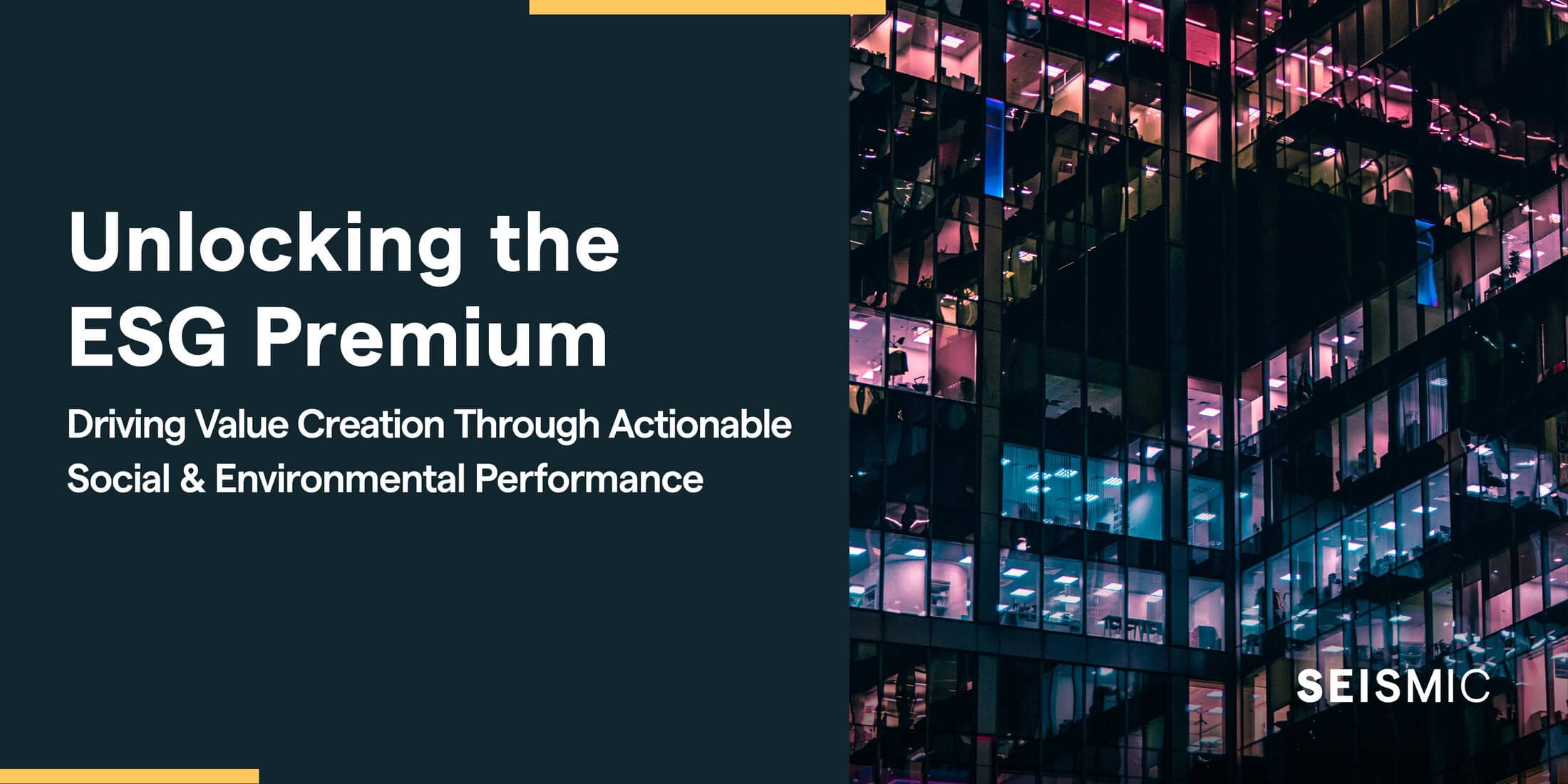
In our recent in person Breakfast Briefing, we brought together leaders from the Private Equity community to uncover how ESG performance is a key value-creation tool.
Seismic’s Cofounder and CEO Paul Lewis led the discussion, joined Alex Bexon Director of ESG at LDC, the private equity investor which is part of Lloyds Banking Group who shared his 10+ years of experience in developing ESG strategies to understand, track and clearly communicate performance to stakeholders.
The session explored how ESG can be shifted from a competing demand, to a complementary driver of value, ultimately reducing reputational risk to meet stakeholder demands across the entirety of the portfolio.
In this article, discover the key learnings and takeaways from the session.
The commercial case for ESG
With $70 trillion of private wealth expected to transfer from the post-World War II generation to the younger generation over the next 20 years,¹ there is an important alignment of organisational responsibility and future profitability that is driving forward the future business landscape.
From operational efficiency, brand value, exit valuation and success, the evidence is gaining for the significant commercial value and benefits generated from organisational efforts focusing on improving ESG.
The upcoming generations are making more considered employment decisions based on organisational values and mission that are aligned with their personal views. As such, an organisation’s ESG profile is having a direct impact on its talent quality, attraction and retention. This extends further to the organisation’s business development: from RFPs in a B2B environment, to buying decisions within a B2C environment, ESG credentials are at the heart of the buying decisions more than ever before.
Recent data shows that 72% of investors have abandoned transactions over ESG concerns, and more than 83% are willing to pay a premium of at least 3% for an asset with a strong ESG profile.² This growing evidence is clearly correlating the quality of a company’s ESG metrics to investor attraction, from valuation through to a successful exit. Therefore, the case for implementing a sustainability strategy within the business, and across the portfolio, is becoming increasingly vital in order to drive value throughout the investment lifecycle.
Creating value within your portfolio with LDC
Alex Bexon, Director of ESG at LDC, the private equity arm of Lloyds Banking Group, joined us for the session. Having spent 10 years as an ESG advisor at Deloitte before joining LDC, Alex is responsible for the ESG performance of the entire portfolio, in addition to helping them with their own sustainability credentials.
Here’s a look at his key insights:
What is the link between ESG and value creation?
Positive ESG performance is a proxy for good management processes. With the following practices in place, your organisation is more likely to be a better business and potentially obtain a higher valuation on exit:
- A positive and mature approach to ESG embedded across all operations
- A management team that understands their material ESG risks, with robust risk management and mitigation processes
- A considered approach to the benefits that diversity can bring to the business
- A culture that ensures people go home safe and well at the end of each day
- A proactive approach to operate in a way that efficiently uses energy and realises it is both a risk and opportunity
How does LDC encourage portfolio companies to join them on their ESG journey?
Their investment approach has been founded on collaboration, engagement, influence and building trusted relations with their management teams, to encourage continuous growth and improvement. This collaborative approach can be broken down into 5 key steps:
- Incremental improvement – Many teams don’t know what ESG means, or may get overwhelmed by it as a concept. It’s essential to remember and communicate that it’s not about doing everything at once, but rather making consistent, incremental changes that enable sustainable growth.
- Materiality – Focusing on 3 or 4 key things that businesses need to address is what will make a big difference in the long term.
- Be pragmatic – Management teams are often time poor with a lack of capacity and resource; pragmatic actions are what make a difference. Set realistic timelines on it to encourage action.
- Motivation and competition – Never underestimate how competitive private equity management teams are. If you’re able to gamify ESG in some way, how they compare against the portfolio, they will feel motivated and driven to take action.
- Opportunity – Private Equity CEOs are opportunity driven, not risk driven. If you’re able to frame ESG as an opportunity, you’re far more likely to get traction and make meaningful progress.
The inhibitors and opportunities for unlocking the ESG premium
Though ESG is an evident driver of value creation, many firms face inhibitors when it comes to encouraging and working with portfolio companies to use ESG as an asset within the business.
Common examples include – company capacity, as not all teams have the same capacity to apply to ESG improvements, and don’t have the success metrics of EGS implementation to make a business case for it internally; data requests with management teams needing to be sensitive and mindful around the lack of resource and time to pull large quantities of data; the term ‘ESG’ itself, which can be perceived as an extra cost to the business as opposed to a value creation opportunity.
Though there are barriers that many investors come across when it comes to encouraging their portfolio to improve their sustainability performance, there are a number of things that can be done to communicate and implement these changes in a more productive way.
From dedicated resourcing, the communication of the link between ESG efforts and commercial success and framing ESG through an entrepreneurial lens, to creating portfolio scorecards and striking the balance between box ticking and a tool for value creation – a successful approach is built on collaboration and utilising the resources available to create long term success.

Key takeaways for driving value creation through ESG
Ultimately, the drive for ESG improvements is not only an essential factor for the health and future of our planet and society, but also a key tool for firms to attract the highest performing companies and talent, whilst supporting the portfolio to demonstrate long term value.
Whether you’re considering, building or improving your sustainability strategy across your organisation and portfolio, here are 4 key things to consider:
- Be smart – let’s be streetwise and entrepreneurial in our ESG implementation. There’s plenty of streams of opportunity. If we can jump on these, we can build a greater impact.
- Consider your language – the language of how we talk about ESG is really important. We need to be wise about when we use the term, with the knowledge that there’s a lot of times when we can’t, or maybe shouldn’t, in order to generate impact.
- Minimise the data – it is crucial for building the case for ESG, but we must be sensitive about asking for so much. Rather, we should ask for the data once and do great things with it multiple times.
- Optimise opportunity – so many leaders are opportunity driven rather than risk driven. Let’s hone in on that and nurture natural competitiveness.
B Corp for Private Equity
If you’d like to understand how to create value through ESG, our B Corp for Private Equity guide uncovers how the B Corp framework is a crucial tool to create long term value and resilience through ESG implementation.
Seismic as your partner for change
As your strategic partner, Seismic supports you throughout the fund and investment cycle, helping you to mitigate risk, capitalise on opportunities and meet regulatory and limited partner expectations with ease and confidence.
Discover how we support Private Equity firms, and speak with a Private Equity expert.
² 2024 ESG in M&A Trends Survey


